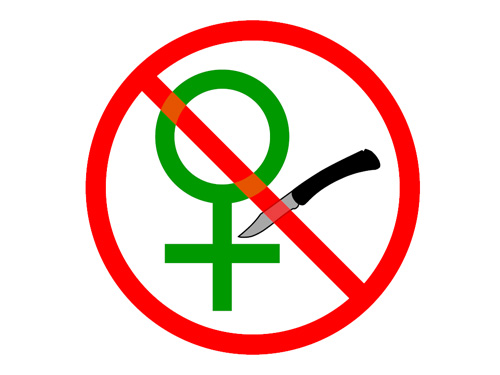
The World Health Organisation defines female genital mutilation as “all procedures that intentionally alter or cause injury to the female genital organs for non-medical reasons.”
In order to protect professionals, the Female Genital Mutilation (FGM) Act provides that no offence is committed if an approved person performs a surgical operation on a girl, which is necessary for her physical or mental health, or on a girl who is in labour or has just given birth, for purposes connected with the labour or birth.
New duty to report
From a date still to be determined, professionals, including social workers, in England and Wales will have a new duty to notify the chief of police, orally or in writing, within a month of discovering that FGM appears to have been committed on a girl under 18.
The discovery will have to be made in the course of work and arise either when a girl reports FGM or when the professional observes physical signs and has no reason to believe it is necessary for physical or mental health. Such a notification will not breach the confidence of the child.
This new duty to report is introduced by a section inserted into the FGM Act by the Serious Crime Act 2015. There is no penalty for failure to report stated in the Act, but any such failure will be a matter for the Health and Care Professions Council to consider.
There is currently no mandatory duty to report FGM to police. Existing duties to report arise from General Medical Council guidance.
Care proceedings
The Family Court has considered when it would be appropriate to issue care proceedings if a child is suspected of having received FGM. This matter was clarified on 27 March, in the case Re B and G (Children) No 2 in the Family Court.
Sir James Munby, president of the family division, found all types of FGM constituted “significant harm” under the Children Act 1989. He also concluded that FGM could never amount to “reasonable parenting” as defined in the Act.
He highlighted two significant factors to be considered in relation to the welfare evaluation and the need for a proportionate outcome.
FGM is often a single act carried out on a child with no subsequent risk of future mutilation. If there are no other female siblings in the family unit, what weight should be given to the single act in the welfare evaluation?
The family unit
Moreover, if the girl who has been cut has a brother and FGM is the only threshold factor, there is no statutory basis for care proceedings in respect of the brother. Should the family unit be split in those circumstances?
The president concluded that local authorities, and by implication social workers, should not be quick to jump to the conclusion that FGM should lead to removal and adoption of the victim. In this case, after the president queried the care plan advocating adoption, the local authority changed its stance.
Prevention is better than cure. FGM Protection Orders, which will come into force in due course (there is no set date at the moment), will be a civil remedy ordered by family courts to protect girls at risk.


 Bournemouth, Christchurch and Poole
Bournemouth, Christchurch and Poole  Hampshire County Council
Hampshire County Council  Lincolnshire County Council
Lincolnshire County Council  Norfolk County Council
Norfolk County Council  Northamptonshire Children’s Trust
Northamptonshire Children’s Trust  South Gloucestershire Council
South Gloucestershire Council  Wiltshire Council
Wiltshire Council  Wokingham Borough Council
Wokingham Borough Council  Children and young people with SEND are ‘valued and prioritised’ in Wiltshire, find inspectors
Children and young people with SEND are ‘valued and prioritised’ in Wiltshire, find inspectors  How specialist refugee teams benefit young people and social workers
How specialist refugee teams benefit young people and social workers  Podcast: returning to social work after becoming a first-time parent
Podcast: returning to social work after becoming a first-time parent  Podcast: would you work for an inadequate-rated service?
Podcast: would you work for an inadequate-rated service?  Family help: one local authority’s experience of the model
Family help: one local authority’s experience of the model  Workforce Insights – showcasing a selection of the sector’s top recruiters
Workforce Insights – showcasing a selection of the sector’s top recruiters 

 Facebook
Facebook X
X LinkedIn
LinkedIn Instagram
Instagram
Comments are closed.